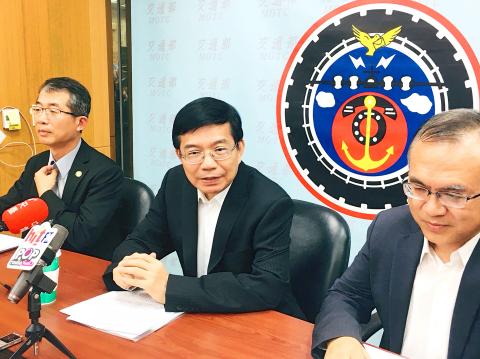Despite strong opposition from Uber Technologies and its drivers, the Ministry of Transportation and Communications yesterday said that it would early next month announce the final version of an amendment to Article No. 130-1 of the Transportation Management Regulations (汽車運輸業管理規則) once it has been approved at a weekly ministerial meeting on Friday.
The article, which has been dubbed the “Uber clause,” defines vehicle rental services and taxis as different businesses that are subject to separate regulations, and that the former would have to charge passengers by hourly or daily rates.
The ministry had proposed amending the regulations after Uber was found to use its partnership with a vehicle rental business to engage in taxi services, which the ministry said would disrupt the order of the market.

Photo: Hsiao Yu-hsin, Taipei Times
The amendment, which was announced on Feb. 21, has already gone through a 60-day consultation period, which ended on April 26.
The amendment passed a review by the ministry’s legal affairs committee on Friday last week, Deputy Minister of Transportation and Communications Wang Kwo-tsai (王國材) said at a news conference in Taipei yesterday.
The ministry said it would give Uber and its drivers a four-month transitional period to meet the requirements in the amendment before it would implement fines of between NT$9,000 and NT$90,000 for those contravening the regulations from October, it said.
Knowing that Uber drivers are scheduled to protest at the Executive Yuan today, Wang said that the ministry hosted the news conference to show its unwavering determination to enforce the law.
“We want to tell Uber that it should not harbor any expectation that the ministry would change its position on the issue. The company has been given a way to lead its drivers to the right path. If it wants to continue operating in Taiwan, then it should apply to become a taxi business operator,” Wang said.
To become a taxi business operator in the nation, one needs to have a minimum of NT$5 million in capital and purchase insurance for passengers, which should not be difficult for a company such as Uber, he said, adding that Uber drivers can continue offering a high-quality taxi service if they become legal taxi drivers.
Uber could also become a legal operator by joining the nation’s diversified taxi service program, Department of Railways and Highways Director-General Chen Wen-ruey (陳文瑞) said.
Uber can still work with vehicle rental operators, but it would have to adhere to the amended Article 103-1 in the Transportation Management Regulations, he said.
The National Police Agency has agreed to hold 37 taxi registration certificate exams between next month and September for Uber drivers interested in becoming legal taxi drivers, Chen said.
Both the Taxi Business Association of the Republic of China and various taxi service operators have pledged to set up telephone lines to assist Uber drivers in joining taxi companies, he added.
Chen also said that the ministry would reduce the administration fee of about NT$1,250 for Uber drivers seeking to join the diversified taxi service program.
Directorate-General of Highways Director-General Chen Yen-po (陳彥伯) said that vehicle rental operators working with Uber and other platforms would be asked to provide their business plans, adding that the business plan should include the number of vehicles in their fleet and the vehicles’ license numbers.

South Korean K-pop girl group Blackpink are to make Kaohsiung the first stop on their Asia tour when they perform at Kaohsiung National Stadium on Oct. 18 and 19, the event organizer said yesterday. The upcoming performances will also make Blackpink the first girl group ever to perform twice at the stadium. It will be the group’s third visit to Taiwan to stage a concert. The last time Blackpink held a concert in the city was in March 2023. Their first concert in Taiwan was on March 3, 2019, at NTSU Arena (Linkou Arena). The group’s 2022-2023 “Born Pink” tour set a

CPBL players, cheerleaders and officials pose at a news conference in Taipei yesterday announcing the upcoming All-Star Game. This year’s CPBL All-Star Weekend is to be held at the Taipei Dome on July 19 and 20.

The Taiwan High Court yesterday upheld a lower court’s decision that ruled in favor of former president Tsai Ing-wen (蔡英文) regarding the legitimacy of her doctoral degree. The issue surrounding Tsai’s academic credentials was raised by former political talk show host Dennis Peng (彭文正) in a Facebook post in June 2019, when Tsai was seeking re-election. Peng has repeatedly accused Tsai of never completing her doctoral dissertation to get a doctoral degree in law from the London School of Economics and Political Science (LSE) in 1984. He subsequently filed a declaratory action charging that

The Hualien Branch of the High Court today sentenced the main suspect in the 2021 fatal derailment of the Taroko Express to 12 years and six months in jail in the second trial of the suspect for his role in Taiwan’s deadliest train crash. Lee Yi-hsiang (李義祥), the driver of a crane truck that fell onto the tracks and which the the Taiwan Railways Administration's (TRA) train crashed into in an accident that killed 49 people and injured 200, was sentenced to seven years and 10 months in the first trial by the Hualien District Court in 2022. Hoa Van Hao, a